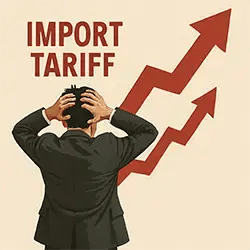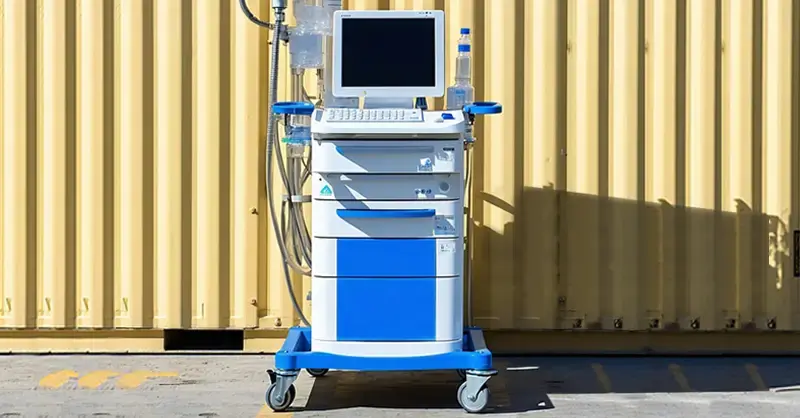The introduction of new US tariffs for medical carts and other devices manufactured overseas has caused significant concern in the medical device manufacturing industry. Companies who sell to the U.S. market are now considering onshoring as a viable strategy to mitigate the challenges and enhance their supply chain resilience.
Understanding the New US Tariffs on Medical Carts
The US government has recently imposed new tariffs on medical products and technology manufactured abroad, which includes medical carts and other device-integrated systems produced globally. The new tariffs are part of a broader strategy to protect domestic manufacturing industries in the U.S. and help reduce dependency on foreign imports. More specifically, these tariffs will affect a wide range of medical devices and components that are essential to the healthcare industry. Not only does this include complete medical carts, but also the various parts and materials used in their production, such as electronic components, metal frames, and specialized coatings.
By imposing these tariffs, the government aims to incentivize companies to shift their production back to the United States, thereby bolstering local manufacturing capabilities and creating more jobs within the country. This move is also intended to enhance national security by ensuring that critical medical supplies are readily available and not subject to international supply chain disruptions.
Impacts on the Medical Device Industry
The new tariffs may have a profound effect on the entire medical device manufacturing industry. Overall, the changes present a complex challenge for companies that have long relied on cost-effective manufacturing overseas - forcing them to reconsider their futures, business operational strategies, and supply chains.
Beyond the immediate response in the stock market that paints a degree of financial uncertainty, many companies also face fierce competition and the potential for lower-quality device production.
Disruption from these tariffs could force many medical device manufacturers to re-evaluate their strategies and explore alternative solutions. Some companies remain confident in their current course, while some economic experts suggest the potential for immediate issues.
 Potential short terms effects:
Potential short terms effects:
- Reduced R&D, potential layoffs
- Increased labor, operational costs
- Material, parts, components shortages
- Supply chain disruptions or volatility
- Increased pricing to the consumer
- Increased MOQ, higher risk
Economic Challenges and Rising Costs
The economic challenges brought about by the new tariffs are multifaceted. For companies that manufacture medical carts or device-integrated systems overseas, the increased costs present a significant change. These companies must either absorb the additional expenses or pass them on to customers, both of which have negative implications.
Cost implication example: A simple storage cart coupled with a device may not soar in price if sourced locally, while an advanced system with a dynamic supply chain may have much heavier cost implications.
Moreover, the uncertainty surrounding future trade policies adds another layer of complexity. Device manufacturers must navigate fluctuating tariffs and the potential trade wars between governments, which can disrupt long-term planning and investment. The rising costs associated with these tariffs also impact other areas, including labor, materials, supply chain, and transportation.
The Strategic Shift towards Onshoring
In response to these challenges, many companies are considering onshoring as a strategic alternative. Onshoring involves relocating manufacturing processes back to the United States, thereby reducing dependency on foreign suppliers and mitigating the risks associated with international trade policies.
Onshoring offers several advantages, including greater control over production processes, reduced shipping times, and enhanced quality assurance. By bringing manufacturing closer to home, companies can respond more swiftly to market changes and regulatory requirements.
Benefits of Onshoring for Supply Chain Strength
Onshoring the manufacturing of your medical cart can provides long-term benefits that can significantly strengthen supply chain resilience. By manufacturing medical carts domestically, companies can reduce their exposure to international trade risks and tariffs - in addition to other potential key benefits. This stability is crucial for maintaining consistent supply chains and meeting customer demands.

Potential of Using a U.S. Based Cart Supplier
- Reduced exposure to international trade risk and tariffs
- Improved communications, relationships, or quality
- More consistent, locally sourced supply chain
- Reduced minimum order quantities (MOQ's)
- Demand-centric supply of medical carts
- Cost reduction analysis / opportunities
Furthermore, onshoring can lead to cost savings in the long run. While initial investments in domestic facilities may be substantial, the reduction in shipping costs, tariffs, and other import-related expenses can offset these investments over time. Additionally, onshoring fosters job creation and economic growth within the United States, contributing to a more robust and self-sufficient industrial base.
Selecting a U.S. Based Medical Cart Manufacturer to Onshore
When selecting a U.S. based medical cart manufacturer or supplier, it's essential to consider several key factors to ensure a successful partnership. Below are some of the basics to consider first.
- Evaluate the manufacturer's experience and reputation within the industry, as well as their ability to meet specific regulatory standards and certifications required for medical devices. IEC 60601-1 compliance for medical carts integration may be important, and ISO 13485 or 9001 certifications may be required.
- Assess their production capabilities, including the quality of materials used and the technology they can integrate into your carts. Consider whether they offer end-to-end manufacturing capabilities.
- Consider their flexibility in customization to meet your unique needs and their capacity for scaling production of your medical cart or system as demand grows.
- Review their ability to deliver a quality product on-time and any process for reconciliation of issues - which is crucial for maintaining operational efficiency and reliability.

